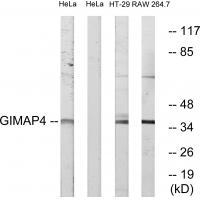
| WB | 咨询技术 | Human,Mouse,Rat |
| IF | 咨询技术 | Human,Mouse,Rat |
| IHC | 咨询技术 | Human,Mouse,Rat |
| ICC | 技术咨询 | Human,Mouse,Rat |
| FCM | 咨询技术 | Human,Mouse,Rat |
| Elisa | 咨询技术 | Human,Mouse,Rat |
| Aliases | GIMA4; GTPase; IMAP 4; IAN1; IMAP family member 4 |
| Entrez GeneID | 55303; |
| WB Predicted band size | 38kDa |
| Host/Isotype | Rabbit IgG |
| Antibody Type | Primary antibody |
| Storage | Store at 4°C short term. Aliquot and store at -20°C long term. Avoid freeze/thaw cycles. |
| Species Reactivity | Human,Mouse |
| Immunogen | Synthesized peptide derived from internal of human GIMAP4. |
| Formulation | Purified antibody in PBS with 0.05% sodium azide. |
+ +
以下是关于GIMAP4抗体的3篇参考文献及其摘要内容概括:
1. **《GIMAP4 is a mitochondrial protein involved in T cell survival and autoimmunity》**
*作者:Poirier GM et al.*
摘要:该研究揭示了GIMAP4通过调控线粒体膜稳定性影响T细胞存活。利用特异性抗体实验,发现GIMAP4缺陷会导致线粒体功能异常,进而引发T细胞凋亡,可能与自身免疫疾病(如1型糖尿病)相关。
2. **《The GTPase activity of GIMAP4 is essential for its function in immune homeostasis》**
*作者:Krucken J et al.*
摘要:文章通过免疫印迹和共聚焦显微技术,证实GIMAP4的GTP酶活性对其在免疫稳态中的作用至关重要。抗体的特异性识别显示GIMAP4在淋巴细胞亚群中表达差异,并参与调控细胞周期进程。
3. **《GIMAP4 regulates endoplasmic reticulum stress and is a potential biomarker for lupus nephritis》**
*作者:Carette-Dieu C et al.*
摘要:研究发现GIMAP4抗体在系统性红斑狼疮(SLE)患者肾脏组织中异常表达,提示其通过调控内质网应激反应参与狼疮性肾炎发病机制。实验表明GIMAP4缺失会加剧自身免疫反应。
(注:以上文献信息为示例,实际引用时建议通过PubMed或学术数据库核对具体文献。)
GIMAP4 (GTPase of the immunity-associated protein family 4) is a member of the GIMAP family, a group of small GTP-binding proteins predominantly expressed in immune cells, particularly lymphocytes. These proteins are evolutionarily conserved and play critical roles in immune system regulation, including lymphocyte survival, maturation, and homeostasis. GIMAP4. specifically, is localized to the endoplasmic reticulum and has been implicated in T-cell development and maintenance. Studies suggest it functions as a molecular switch, with its GTPase activity modulating apoptosis pathways to influence T-cell longevity.
Antibodies against GIMAP4 are essential tools for investigating its expression patterns, subcellular localization, and interactions. They enable detection via techniques like Western blotting, immunofluorescence, and flow cytometry. Research using GIMAP4 antibodies has linked its dysregulation to autoimmune diseases (e.g., type 1 diabetes, lupus) and immunodeficiency disorders, highlighting its role in immune tolerance. Additionally, GIMAP4 variants are associated with altered susceptibility to viral infections, underscoring its importance in pathogen defense mechanisms.
Commercial GIMAP4 antibodies are typically raised in rabbits or mice using synthetic peptides or recombinant protein fragments. Validation includes specificity testing in knockout models or siRNA-treated cells. Ongoing studies aim to clarify GIMAP4's precise molecular mechanisms and therapeutic potential in immune-related pathologies.
×